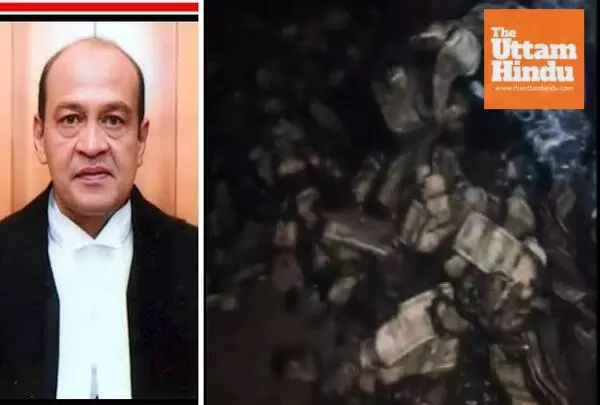
Vice President Questions Silence: No FIR After Cash Found in Judge’s House

New Delhi (The Uttam Hindu)- Vice President Jagdeep Dhankhar on Thursday raised questions over the non-registration of FIR in the case related to the recovery of large amounts of cash from the residence of High Court judge Yashwant Verma. He said whether a category beyond the law is exempted from prosecution.
Dhankhar said, "If this incident had happened at his (common man's) house, then its (filing of FIR) speed would have been like an electronic rocket, but in the above case it is not even like a bullock cart." Dhankhar said that no one came to know about it for seven days. We have to ask ourselves questions. Is the reason for the delay understandable? Is it forgivable? The Vice President said that the judiciary has no kind of protection shield against independent investigation or inquiry. He said that the surest way to push an institution or person towards downfall is to provide it a complete guarantee of protection from investigation. On March 14, the Supreme Court had ordered an internal inquiry into the case of the alleged recovery of large amounts of half-burnt bundles of notes while extinguishing the massive fire at Justice Yashwant Verma's residence in Delhi on the night of Holi. Apart from this, Justice Verma was sent back to Allahabad High Court from Delhi High Court. Dhankhar also questioned the legal validity of the three-judge committee constituted for internal investigation of the case. He said that a three-judge committee is investigating the matter, but investigation is the domain of the executive, not the judiciary. The Vice President claimed that the committee has not been constituted under any provision of the Constitution or law.
He said, "And what can the committee do? The committee can at most recommend. Recommend to whom? And for what?" Dhankhar said, "Under the kind of system we have for judges, ultimately the only action (removal of a judge) can be taken by Parliament." He said that the committee's report will naturally have no legal basis. Addressing a group of Rajya Sabha trainees here, the Vice President said, "More than a month has passed. Even though this matter may cause embarrassment or discomfort, but now the time has come to uncover it. Let the whole truth come out in the public forum, so that the system can be cleaned."
He said that no one knew about this incident for seven days. Dhankhar said, "We have to ask ourselves some questions. Can any explanation be given for the delay? Is it excusable? Doesn't this raise some basic questions? Would things have been different in a case involving a common man?" The Vice President said that after the apex court confirmed the case, it became clear that it needed to be investigated. He said, "Now the nation is waiting impatiently. The nation is restless because one of our institutions, which people have always looked up to with the highest respect and honour, is now in the dock." Emphasising the importance of the rule of law, Dhankhar said that in a democracy, the purity of the criminal justice system determines its direction. He said that in view of no FIR being registered in the case, no investigation is being conducted under the law at present. The Vice President said, "It is the law of the country that every cognizable crime must be reported to the police and not doing so is a crime. Therefore, you all must be wondering why no FIR has been lodged." He underlined that an FIR can be lodged against any person holding a constitutional post, including the Vice President.
Dhankhar said, "Only the rule of law needs to be implemented. No permission is required. But if it is a matter of judges, their category, then an FIR cannot be lodged directly. It needs to be approved by the concerned people in the judiciary." The Vice President stressed that only the President and Governors have been given immunity from prosecution in the Constitution. He wondered, "Then how did a category beyond the law get this immunity?" Underlining the importance of transparency, the Vice President referred to the decision of the Lokpal Bench that the Lokpal has the right to investigate corruption complaints against High Court judges.

